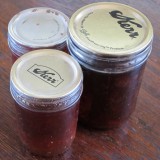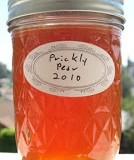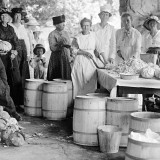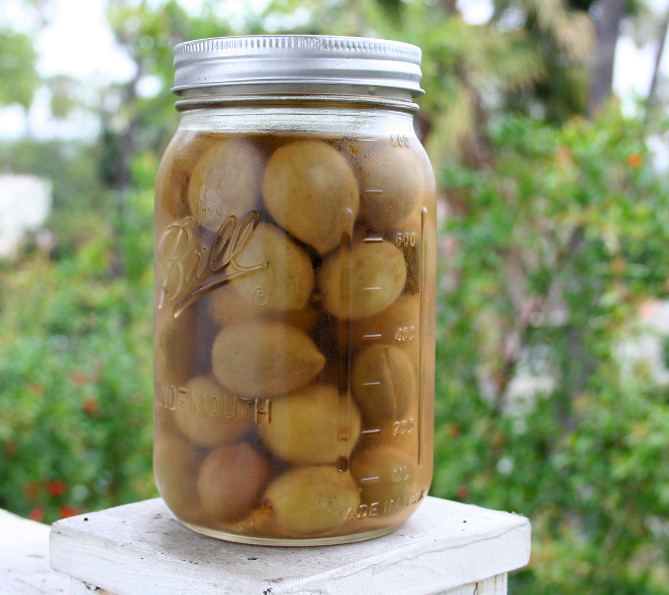Naive me, I purchased a box of Morton’s kosher salt for a pickling project. I thought that kosher salt lacks the anti-caking agents that cause cloudy and sediment filled jars of pickles. No blue ribbon for me at the county fair:
Morton salt has anti-caking agents. But I can follow them on Facebook (why I would want to do that would be the topic of another post). Diamond Salt, on the other hand does not have anti-caking agents:
So, when pickling, be careful selecting your kosher salt–some contain anti-caking agents, others do not.
Another precaution when using kosher salt in food preservation projects comes from the University of Wisconsin Cooperative Extension’s guide to Homemade Pickles and Relishes (pdf):
Kosher pure flaked salt requires special care if used for pickling. Flaked salt weighs less per volume than canning and pickling salt, so you need about 50 percent more—11⁄2 cups of flaked salt equals about 1 cup of canning and pickling salt. If you use kosher salt for fermented pickles, you must weigh out the proper amount.Weigh out 73⁄4 ounces (220 grams) of flaked salt, and you will have the equivalent of 1 cup of canning and pickling salt.
This same publication also notes how easy it is to find pickling salt and how hard it is to find kosher salt. It’s just the opposite here in Los Angeles.
So what kind of salt do you use for pickling and fermenting? What’s the easiest to find where you live?
See the University of Wisconsin’s other tested food preservation recipes here.









I had a heck of a time finding pickling salt here in Tucson. But the. Found that the super target has it. So I bought a huge box and use that. Otherwise I would have bought it online.
Hey, I’m in Tucson too and I found it at Fry’s. I think I also saw some at Food City.
Hmmm,maybe our pickle mystery is finally solved.In fall 2010 I made pickles using my Grandma’s recipe and they were great,I used pickling salt.This past fall (2011) I was busy working so my husband made the pickles but used Kosher salt and they did not turn out very good.Soft and not very flavorful.
I wonder if the caking agents were the problem? Anyone have any thoughts?
We can find both kinds of salts at both of our neighborhood stores year round.
I think the weight of the two salts is interesting and I may look into it a bit more.Weight vs volume is important I know when preserving meats,which we do a lot of,so now I am curious about when pickling.
We have both in abundance here, year round.
Interestingly, all the stores near me have Morton’s Pickling Salt right next to the kosher salt. Go San Diego.
I use sea salt for pretty much everything.
Hey Rols, Soft pickles can be caused by a number of things: not removing the blossoms from the end of the cucumbers (they contain an enzyme that can cause soft pickles), too little acid or salt, insufficient heat treatment, a bad seal, moldy ingredients. I’d suggest finding a tested recipe and comparing it against your family’s recipe. Caking agents are probably not the culprit.
I’ve never had a problem finding pickling salt in the suburbs of Seattle! One of the farm stands sells it right along side their pickling cucumbers. And the Fred Meyer has it with their mason jars.
Here in the Midwest you’ll find both kinds of salt right next to each other. I found that kosher salt was cheaper. I’ll watch for that anti-caking agent next time I buy though.
Thank you Mr Homegrown,I’ve been using my Grandma’s recipe for years and the year my husband made them was the first time they didn’t turn out.
Maybe it was the weight issue,since one would use more Kosher than pickling salt.
Or maybe Grandma was rolling in her grave over the fact that,gasp, a man was doing the canning that day at my house.That would be SO her.
Sea salt it great, but it often has anti-caking agents too.
In Orange county and Long Beach areas I’ve seen pickling salt at Smart & Final usually with the seasonings, not with the mason jars and at Walmart with the mason jars.
Has any one tried other types of pickling like with Japanese rice bran or Korean style fermenting? Lately I’ve been doing more quick pickles and having fun with them.
Cool blog thanks
Is there anyway to have it all… benefits of fermentation, great taste, and no canning necessary? I’d be pickled pink to learn it’s so and to know the how2.
You don’t have to can your fermented products, like dill pickles or kraut. Canning simply ensures a long shelf life, which is good for stocking up. Ferments keep a good while on their own–how long depends on a lot of variables, esp. on how much salt is used and the ambient temp. Back in the old days folks would make a barrel of dill pickles or a big vat of kraut at the end of the summer and keep it somewhere cool– like a root cellar– all winter long. The ferment gets steadily more sour and the pickles less crispy, but they don’t go bad unless the culture fails and bad bacteria move in.
I recommend you read Wild Fermentation by Sandor Katz and Keeping Food Fresh.
Put them in the fridge once the taste is to your liking.
Morton also makes “Canning & Pickling salt” – comes in a bright green 4 lb. box, and is usually right next to the Morton “Kosher salt” on the supermarket shelf.
I had no idea cyanide was kosher (they use the antiquated name ‘yellow prussiate of soda’ because saying sodium ferrocyanide would be bad advertizing, as people may realize it would emit hydrogen cyanide in contact with acidic foods)
I have a salt based water softener so I buy 40 lb sacks of salt for it, I took some food grade (not resin cleaning) softener rock salt to the kitchen and it dissolved clean and made some good pickled greens. $8 of salt could make alot of pickles when purchased in 40 lb sacks, lol.
Anonymous–thanks for catching that amazing factoid and the tip on bulk salt. Here’s what wikipedia says about yellow prussiate of soda: “Despite the presence of the cyanide ligands, sodium ferrocyanide is not especially toxic (acceptable daily intake 0–0.025 mg/(kg body weight)[2]) because the cyanides are tightly bound to the metal. However, like all ferrocyanide salt solutions, addition of an acid (a hydrogen donor) can result in the production of cyanide gas (HCN), which is toxic. In its hydrous form, Na4Fe(CN)6·10H2O (sodium ferrocyanide decahydrate), it is sometimes known as yellow prussiate of soda”
It’s easy to find pickling salt in Texas. It’s in all the grocery stores and Wal-mart.
What is Wal-mart?